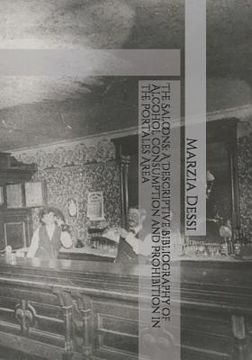Share
The Saloons: A Descriptive Bibliography of Alcohol Consumption and Prohibition in the Portales Area (in English)
Marzia Dessi
(Author)
·
Independently Published
· Paperback
The Saloons: A Descriptive Bibliography of Alcohol Consumption and Prohibition in the Portales Area (in English) - Dessi, Marzia
$ 11.92
$ 14.90
You save: $ 2.98
Choose the list to add your product or create one New List
✓ Product added successfully to the Wishlist.
Go to My WishlistsIt will be shipped from our warehouse between
Friday, June 14 and
Monday, June 17.
You will receive it anywhere in United States between 1 and 3 business days after shipment.
Synopsis "The Saloons: A Descriptive Bibliography of Alcohol Consumption and Prohibition in the Portales Area (in English)"
The aim of this bibliography "The Saloons: A Descriptive Bibliography of Alcohol Consumption and Prohibition in the Portales Area" is to provide a cohesive chronological narrative of the local response to alcohol through the use of oral narratives. "The Saloons" may in addressing this portion of local history prove to be inclusive of many other aspects of life in Portales across 20th century. Local interpretations of alcoholic consumption and behavior are cohesive with the textbook understanding of the United States response to alcohol consumption at large. Portales in its response to alcohol, when viewed through the lens of Eastern New Mexico Universities Oral History Project, can be seen as a large scale representation of colonizers view of the Wild West, as uncivilized and lawless. As is illustrated by the continuous reappearance of the idealized narratives of Billy the Kid throughout the collection, violent depictions of conflicts with Native Americans, and high emphasis on self-sustainability through farming and ranching, as well as saloons serving a central and vital communal role as the meeting place for local action. The saloons were to be eventually be replaced by the churches who serve as the center of the town life and as a colonizing and civilizing force. Through church colonization of the community's understanding of alcohol consumption, as well as other aspects of civilized life the Portales area begins to be portrayed as a dry country a safe haven for the youth, and hence confirms the town status as fully civilized. The narrative of Portales relationship with alcohol throughout the 20th century is one which is cohesive with the narrative of westward colonization, and the larger aim of manifest destiny, and therein is a process of inclusion and exclusion. If taken under the lens of New Mexico's journey to statehood, the lawlessness of the colonial period was striped for a civilized culture in which African Americans 'niggers' and Native Americans 'Indians' are manifested as the 'other'. This other must exist in order for there to be community, or a civilization, given that the norm is defined by those individuals who are not part of it. The norm is defined by the things that it is not rather than by the things which it is. For there to be something which defines the civil from the uncivil, the geopolitics of the region indicating a transformation over a relatively short period of time from a town one third saloon to a town composed of over twenty nine churches.While not a transformation taking place overnight, the growing lack of acceptance for alcohol can be seen as a continuous need for New Mexico at large to be acknowledged as a state independent of its associations with Mexico and the desert wilderness of which it is comprised. In order to undergo this transformation it may be seen as conforming to the national ideal as well as undergoing its own revisionist history in so much as most individuals either idealize or shunn the past, usually the former in relation to farming and ranching, and the latter in the relation to alcohol. While the overwhelming verbalized response is one against alcohol, it should however be noted that there are many occasions in which action and behavior may not correlate and that the voice of the majority of our narrators is typically in line with the narrative of the church and the women's club both closely linked to the moral sphere of the towns communal judgment.
- 0% (0)
- 0% (0)
- 0% (0)
- 0% (0)
- 0% (0)
All books in our catalog are Original.
The book is written in English.
The binding of this edition is Paperback.
✓ Producto agregado correctamente al carro, Ir a Pagar.

